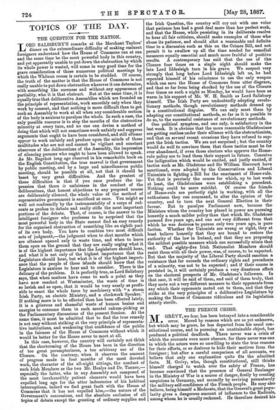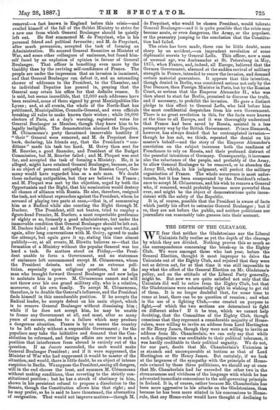THE FRENCH CRISIS.
MGRtVY,we fear, has been betrayed into a considerable . error. Moved by reasons which are as yet unknown, but which may be grave, he has departed from his usual con- stitutional course, and in pursuing an unattainable object, has produced a political deadlock. There never was a crisis of which the accounts were more obscure, for there never was one in which the actors were so unwilling to state the true reasons for their efforts, or so desirous to hide their motives from the foreigner ; but after a careful comparison of all accounts, we believe that only one explanation quite Ste the admitted facts. M. Grevy, who, though constitutional, still thinks himself charged to watch over the safety of France, has become convinced that the presence of General Boulanger in the Ministry of War is a source of danger, firstly by creating suspicions in Germany, and secondly by reviving prematurely the military self-confidence of the French people. He may also believe, being himself a Moderate, that the General's great popu- larity gives a dangerous amount of influence to the Radicals, among whom he is usually reckoned. He therefore desired his removal—a fact known in England before this crisis—and availed himself of the fall of the Goblet Ministry to strive for a new one from which General Boulanger should be quietly left out. He first summoned M. de Freycinet, who is his personal friend and political favourite ; and M. de Freycinet, after much persuasion, accepted the task of forming an Administration. He secured General Saussiere as Minister of War, and some other colleagues of eminence, but found him- self faced by an explosion of opinion in favour of General Boulanger. That officer is benefiting even more by the timidity than by the reviving self-confidence of France. The people are under the impression that an invasion is imminent, and that General Boulanger can defeat it, and an astounding shower of addresses to the President, to the Chamber, and to individual Deputies has poured in, praying that the General may retain his office for that definite reason. It is said, but seems incredible,-that 12,000 such addresses have been received, some of them signed by great Municipalities like Lyons ; and, at all events, the whole of the North-East has petitioned, Municipalities, Councils-General, and even officials breaking all rules to make known their wishes ; while 38,000 electors of Paris, at a day's warning, registered votes for General Boulanger as Member, though they knew him to be legally ineligible. The demonstration alarmed the Deputies, K Clemenceatis party threatened immovable hostility if " their " General were removed, and M. de Freycinet drew back, declaring, his friends say, that the President's "con- ditions" made his task too hard. M. Gravy then sent for M. Bouvier, a good financier, and President of the Budget Commission, but M. Bouvier failed ; and M. Floquet was sent for, and accepted the task of forming a Ministry. He, it is alleged, might have retained General Boulanger, because, as he is an object of personal antipathy to the Russian Court, Ger- many would have regarded him as a safe man. We doubt these enduring antipathies, but they are believed in France ; and M. Floquet was met by the objection, urged by both the Opportunists and the Bight, that his nomination would destroy all chance of alliance with Russia. He also, therefore, resigned the task, not without reproaches against the President, whom he accused of playing two parts at once,-that is, of summoning him as a Radical while also courting the Right through M. Duclerc. The President, still not beaten, tried to employ a figure-head Premier, M. Duclerc, a most respectable gentleman of eighty or so, formerly a good administrator, but under the immovable condition that General Boulanger should be left out. M. Duclerc failed ; and M. de Freycinet was again sent for, and again, after long conversations with K Gravy, agreed to make the attempt, but again gave it up, stating this time almost publicly—or, at all events, M. Blowitz believes so—that the formation of a Ministry without the popular General was too hard a task. So matters stood on Friday,—the Presi- dent unable to form a Government, and no statesman of eminence left unsummoned except M. Cldmenceau, whom the President detests, not only as an extreme poli- tician, especially upon religious questions, but as the man who brought forward General Boulanger and now helps to maintain him in power. M. Clemenceau cannot and will not throw over his one grand military ally, who is a relative, moreover, of his own family. To accept M. Clemenceau, therefore, is to double the General's influence, and the President finds himself in this unendurable position. If he accepts the Radical leader, he accepts defeat on his main object, which is to remove General Boulanger without dismissing him ; while if he does not accept him, he may be unable to frame any Government at all, and must, after so many years of success, confess to a failure which may produce a dangerous situation. France is by no means the country to be left safely without a responsible Government ; for the populace may take the initiative and demand that the Con- stitution be reformed, and foreign affairs are never in such a position that interference from abroad is entirely out of the question. If an enteute succeeded, the mob would make General Boulanger President ; and if it were suppressed, the Minister of War who had suppressed it would be master of the situation, and would, there is little doubt, be an object of intense suspicion in Berlin. We suppose the President,seeing all dangers, will in the end choose the least, and summon M. Clemenceau without making conditions, thus reverting to the strictly con- stitutional position ; but he has a streak of obstinacy in him, shown in his persistent refusal to propose a dissolution to the Senate, though the Constitution allows him that right; and he may prefer, as he is said to have threatened, the alternative of resignation. That would not improve matters—though M.
de Freycinet, who would be chosen President, would tolerate General Boulanger—and it is quite possible that the crisis may become acute, or even dangerous, the Army, or the populace, or the peasantry jumping to the conclusion that the Constitu- tion had failed.
The crisis has been made, there can be little doubt, more sharp by an accident,—an imprudent revelation of some diplomatic secrete by General Leflo. This officer, now a man of unusual age, was Ambassador at St. Petersburg in May, 1875, when France, and, indeed, all Europe, believed that the German Government, alarmed at the sudden revival of military strength in France, intended to renew the invasion, and demand certain material guarantees. It appears that this intention, though denied in Berlin, was considered serious not only by the Duo Decazes, then Foreign Minister in Paris, but by the Russian Court, so serious that the Emperor Alexander IL, who was then about to start for Berlin, promised to discover the truth, and if necessary, to prohibit the invasion. He gave a distinct pledge to this effect to General Leflo, who laid before him the most confidential despatches from his own Government. There is no great revelation in this, for the facts were known at the time to all Europe, and it was thoroughly understood that France had been saved by Russia, assisted in a lees peremptory way by the British Government. Prince Bismarck, however, has always denied that he contemplated invasion— though he has not, we think, repeated the denial on his master's behalf—and the story of the Emperor Alexander's conviction on the subject increases both the readiness of Frenchmen to rely on Russia, and their profound distrust of the peaceful intentions of Germany. Consequently, it increases also the reluctance of the people, and probably of the Army, to allow General Boulanger to be removed, or to abandon the Army Bill, which, in his judgment, will perfect the military organisation of France. The whole occurrence is most unfor- tunate, but it has been exasperated by the President's reluct- ance to accept M. Clemencean, and his wish to remove a General who, if removed, would probably become more powerful than. ever, and might be the object of demonstrations quite incon- sistent with the safety of the Republic.
It is, of course, possible that the President is aware of facts which justify his effort to ostracise General Boulanger ; but if so, they are not before the public, and neither politicians nor journalists can reasonably take guesses into their account.



































 Previous page
Previous page